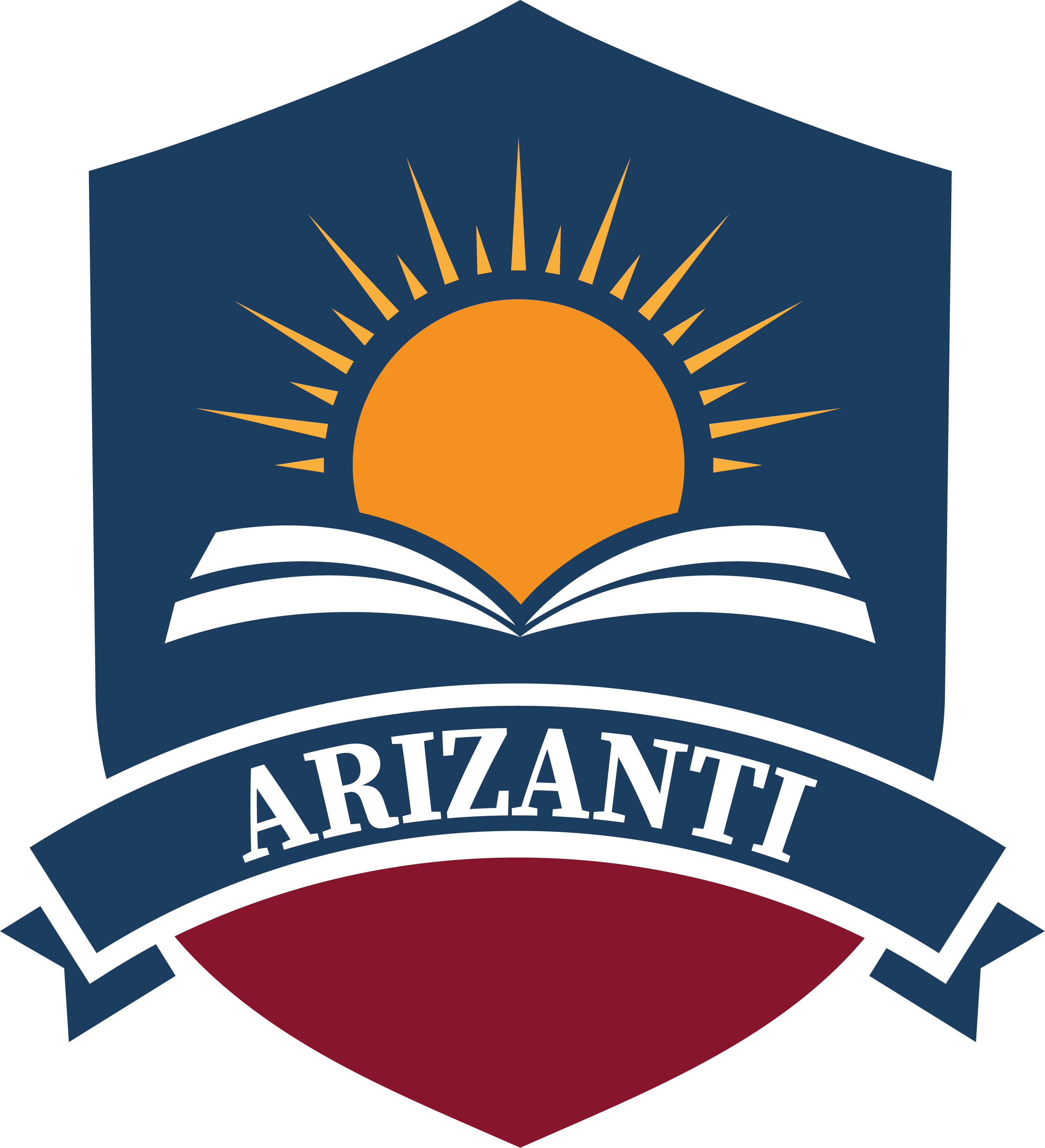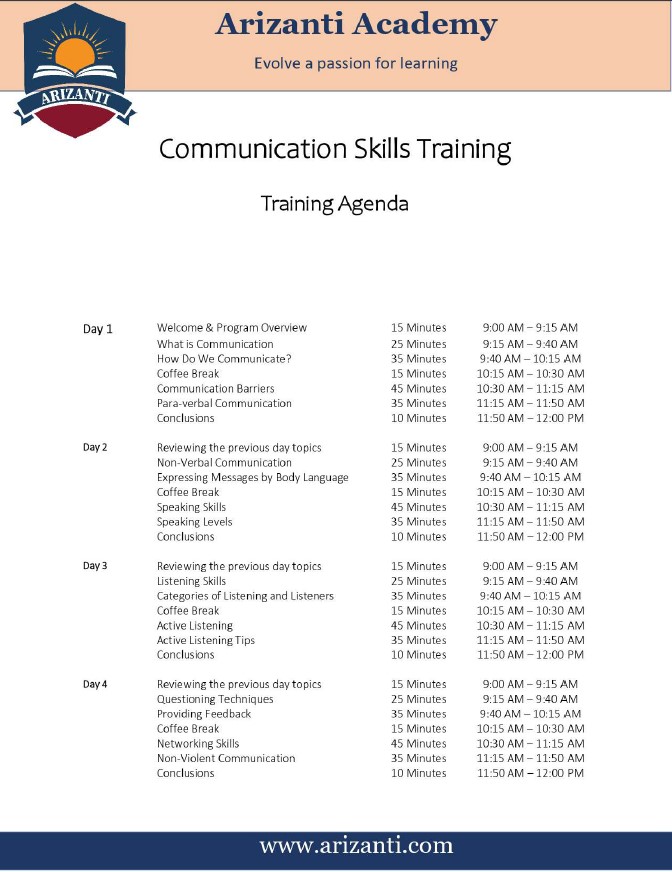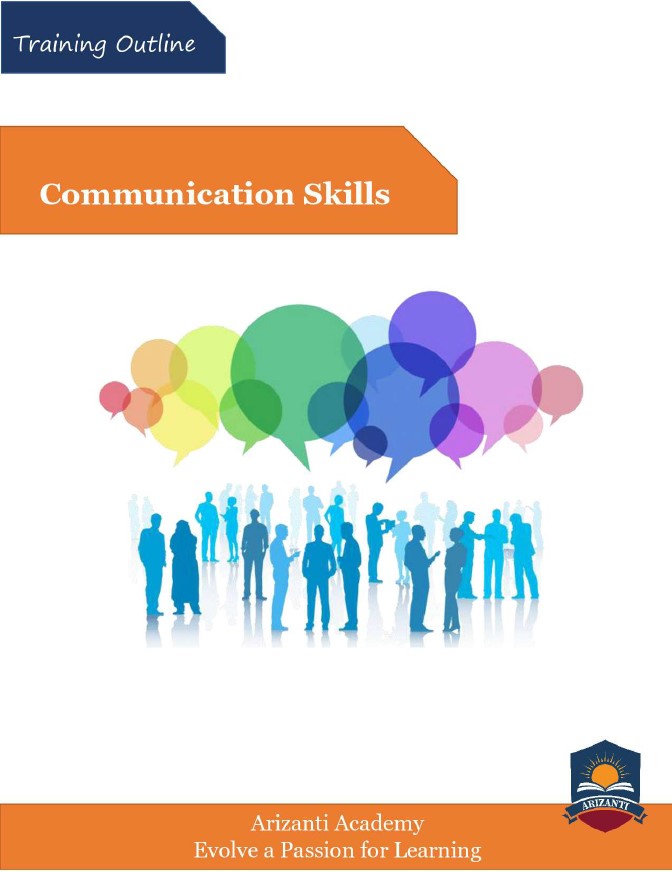By the end of this training, we expect the participants to have a deeper understanding of the importance of communication skills through:
- Understanding the communication process and identifying the main internal and externals barrier that affects their communication approaches.
- Recognizing different styles of communication.
- Identifying the effective use of body-language gestures and voice tones.
- Apply the skills necessary to communicate in an effective manner.
- Gaining networking skills and creating effective first impressions.
- Handling feedback and criticism constructively.
- Create a positive work environment through improved awareness of non-violence communication.
What will you learn?
The purpose of this session is to identify the concept of communication and its impact on personal and professional life by discussing the definition of communication and identifying the main types and styles of communication and what we mean by each. The discussions will cover also the components of the communication process, factors affecting each component, and the most important barriers to effective communication in personal life as well as the work environment.
At the end of this day the trainees were able to have a better understanding of:- The Effectiveness of Communication.
- The Components of Communication Process.
- Communication Barriers.
- Para-verbal Communication.
The purpose of this session is to focus on the non-verbal communication and the importance of realizing the great role that the human body plays in the communication process. The elements of personal communication and the role of body gestures in enhancing or distorting our messages will be discussed thoroughly. The role that each part of the human body plays in this process would also be addressed to illustrate the need to employ each part in an appropriate manner in promoting our messages as well as in the process of active listening. At the end of the day, the speaking process will be addressed by discussing the speech formulation process as well as the stages of active talking that ensure passing through the auditory filters that each person uses to filter what he hears during the day to ensure that our ideas are communicated to others, persuading them and then obtain their attention and loyalty in the end.
At the end of this day the trainees were able to have a better understanding of:- Non-Verbal Communication Concept.
- Elements of Personal Communication.
- Body Language Role in the Communication Process.
- Speaking Process.
- Speaking Levels.
- Hearing Filters.
The purpose of this session is to discuss the concept of active listening and its essential role in the communicating process. The participants will be involved in discussing the categories of both listeners and listening process and how these differences affect how we send messages to others and how they are interpreted and understood by them. The participants will be subsequently engaged in distinguishing between verbal and nonverbal signs of active listening and the importance and impact of each on the process giving examples of each from their daily, personal and work lives. The last part of the day will be used to give some important tips on effective listening with appropriate examples for each case.
At the end of this day the trainees were able to have a better understanding of:- The Power of Listening.
- Categories of Listeners.
- Categories of Listening.
- Non-Verbal Signs of Active Listening.
- Verbal Signs of Active Listening.
The purpose of this session is to help the trainees to identify the types of questioning techniques and how to use them as a crucial tool in the communication process. At the beginning of the session, the most significant techniques will be identified, such as the technique of directing open and closed questions, as well as probing questions, leading to the use of the funnel technique. During this session, the concept of feedback will be introduced and all aspects related to this concept will be discussed as well, such as effectiveness conditions and different feedback approaches.
As a skill required for all employees, the topic of Networking Skills will be introduced to the trainees, including the importance of ensuring the creating of an excellent first impression on all formal and informal occasions which is obviously a guaranty for establishing any relationship, whether with colleagues within the team or with customers and clients.
The last part of the session is devoted to discussing the concept of non-violent communication and explaining its importance in achieving the best results in the various conflicts that we inevitably fall into every day in a calm and peaceful manner that ensures the development of relations, not its termination.
At the end of this day the trainees were able to have a better understanding of:- Various Questioning Techniques.
- Providing Constructive Feedback.
- Networking Skills.
- Making a First Impression.
- Non-Violence Communication.
Who should attend?
This program is for any business professional who desires improvement of the communication skills of themselves or their employees, to enhance efficiency and productivity within the workplace.
A: Private training courses can be delivered in its location in (Villa No. R3/169, New Azadi-Atconz, Erbil/KRI) or outside venue booked by Arizant Academy when there would be a need, or at your business premises.
Q: In which language the trainings are delivered?A: Our programs can be delivered in Kurdish, Arabic or English.
Q: What are your ideal training schedules?A: Half-day session: (09:00 am to 12:00 pm) or (2:00 pm to 5:00 pm) or to suit. Full-day session: (09:30 am to 15:30 pm) or to suit.
Our trainers are not only the most qualified professionally, but they are also the most capable of delivering information to the trainees. We rely on their selection, in addition to their high scientific specializations, on their experiences and personal abilities in implementing training programs of high value and positive returns, so that the training process does not become a mere waste of time and effort, but rather a real development of capabilities, skills and practical benefit acquired by our clients and their staff and practiced virtually to improve their overall performance.
In Arizanti Academy, we believe that accurate evaluation of training programs, based on scientific foundations and well-thought-out criteria, is the best way to achieve the desired goals of training, achieve maximum benefit from the program, and provide trainees with scientific knowledge, experience and practical skills. Therefore, we have built our evaluation systems based on accreditation and compatibility with a set of evaluation systems and international standards, where we rely in our work on: -
- Evaluation of the training program on the morning of the second day (if the program lasts for more than one day) to avoid any shortcomings in the program, and to achieve the objectives of the participants as groups and individuals.
- Participants' evaluation of the training material, the trainer, the place of training, training services and coordination on the last day of the program (this report is analyzed and the results are sent with the original evaluation sheets to the client with the final report).



